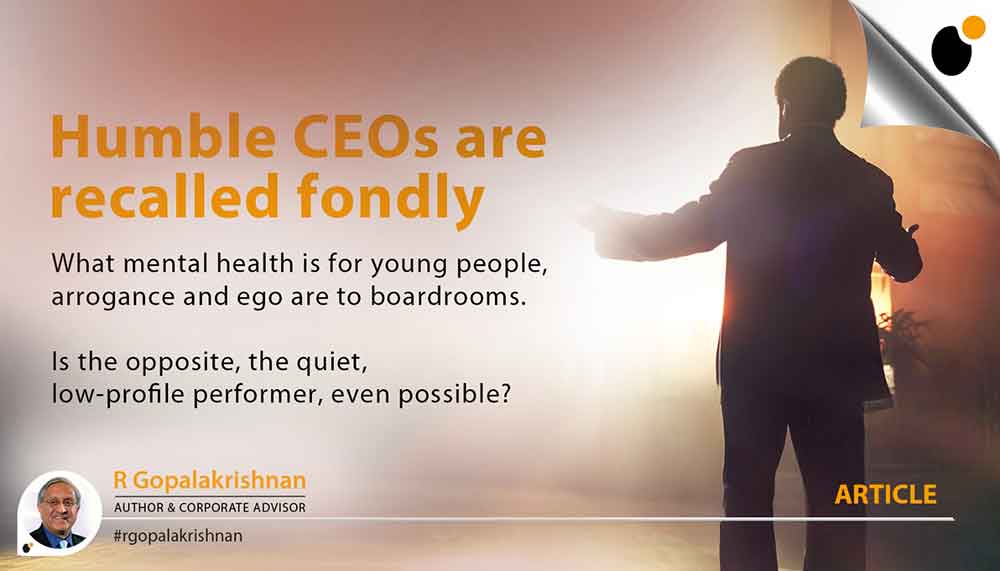13th March 2020 BUSINESS STANDARD
R. Gopalakrishnan*
Email: rgopal@themindworks.me
(*The author is a corporate advisor and Distinguished Professor of IIT Kharagpur. During his career, he was Director of Tata Sons and Vice Chairman of Hindustan Unilever).
Alibaba founder, Jack Ma, said recently that education should develop ‘wise’ people instead of ‘bright and intelligent’ people– the latter can get replaced by AI and machines. Wisdom comes from experience and is learnt by the heart; wisdom is imprinted in the right brain unlike intelligence, which is a left-brain imprint. In my Wise Leader column on 14th Feb, I had commented on the directorial responsibility to select the right CEO and to facilitate leadership transitions.
This article concerns a paradox: how CEOs tend to get judged versus how they ought to be judged. Of course, a CEO should be evaluated for impact on company performance; but these metrics are commonly calculated for the CEO’s precise tenure, and this has an inbuilt flaw. For a period, maybe 2-3 years after taking charge, a CEO’s performance is influenced by the organizational momentum that the CEO inherited. Likewise, after departure, the CEO’s successor inherits an organizational momentum. This momentum may be positive or negative. Hence, reading performance numbers for the CEO’s precise tenure gives an imprecise picture of the CEO’s impact.
The impact of the CEO on people and relationships is extremely important. This is difficult to measure and is admittedly subjective. Academics call the “ways of knowing” as epistemology and directors need epistemological information on the CEO’s people impact. Directors should not fall into the trap described by Daniel Kahneman as WYSIATI–what you see is all there is!
Has the CEO’s impact on people been effective and motivating or has it been fractious and turbulent? Recall superlative institutional leaders. How affectionately people regard JRD Tata well after he departed from Air India or Tata! How warmly people regard Vikram Sarabhai at Atomic Energy, Ravi Mathai at IIMA or RK Talwar at SBI! Keshab Mahindra of M&M commands respect and love. In contrast, think of Vijay Mallya or the Ranbaxy Singh brothers
Some years ago, in a discussion with a naval officer, I asked how to judge the quality of a ship, apart from the technical specifications. His reply was that an observer should note the ‘wake’ of the boat. I learned that wake is a boating term connected with the trail of disturbed water that is left after the boat has moved. Some years later, I came across the writing of coach Dr Henry Cloud, who compared a leader’s impact on people to the wake of a boat. Leadership wake is like a boat that ploughs through the water. Some leave a smooth and symmetric pattern while others drench people and capsize other boats in seeming disregard of their impact. An effective leader should leave a wake which people recall with professional respect, while enhancing human dignity and emotion.
HUL chairmen, who changed every decade, mostly left a positive wake; many got promoted into the parent board. Likewise, with leadership transitions in Tata Consultancy Services, Titan Industries, Asian Paints and Pidilite Industries.
Long-tenure CEOs are vulnerable to behaving like God; they are so treated by those around. Intensive and in-the-face media reportage often works against quiet and efficient succession. Without doubt, it is negative for sycophants and media to gush that a leader is difficult to replace. My former boss used to say, walk around a graveyard and you will find many who thought they were irreplaceable! In recent years, certain high-profile CEOs were lauded and feted as superlative, but the wake that they left behind is now visible to all.
This happens globally as well. The legendary Jack Welch was a huge evangelist for performance and meritocracy. Yet, his tenure is a subject of contemporary commentary, long after his tenure. It is unfair to comment after two decades, but who can stop commentators? In contrast, the iconic Walt Disney Company was led by Chairman Michael Eisner from 1984 until 2005. When Eisner retired in 2005, his successor, Bob Iger, successfully steered Disney into a hugely valuable and successful company.
In short, a cardinal principle in succession planning by boards is to scrutinize the past wake of the proposed candidate with greater rigor than only rely on performance metrics. Beware of competence without humanity or humility. Did the candidate deliver performance and earn people’s respect without trampling all over? Directors can make serious enquiries and reflect on the admittedly subjective data.



